Nobody Warned Me About the Gypsies
Embarking on any kind of journey is always an adventure, whether or not you have a good idea of what you’re getting yourself into. However (un)prepared you are, what you expect isn’t what you’re going to get. Far from being a deterrent to travel, however, this is actually one of the best incentives to go for it. There’s opportunity in the unplanned. In fact, there’s a kind of beauty in it.
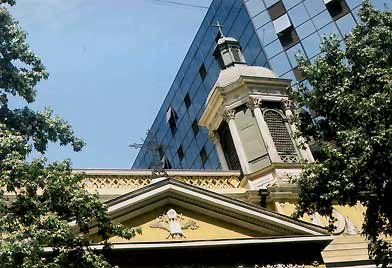 As a rule, I try not to expect anything in particular from places, people, etc... (Laudable goal, but admittedly well-nigh unachievable.) On a similar note, I also try to avoid making elaborate plans before taking a trip. (Definitely doable, albeit borderline dangerous.) Oh, sure, if I run across an appropriate guidebook, I’ll pick it up, and I’m certainly not above soliciting advice from people who’ve “been there, done that.” But I’d venture to guess that like me, many fellow travelers would encourage spontaneity: being open to off-the-cuff experiences, and allowing yourself to get into – and, ideally, out of – different and challenging situations. For that, you need a little flexibility, a little wiggle room in the plans. It’s possible to over-prepare for a trip, right? And over-preparedness doesn’t allow for full appreciation of what there is to see and do and understand in each new place, among each new group of friends.
As a rule, I try not to expect anything in particular from places, people, etc... (Laudable goal, but admittedly well-nigh unachievable.) On a similar note, I also try to avoid making elaborate plans before taking a trip. (Definitely doable, albeit borderline dangerous.) Oh, sure, if I run across an appropriate guidebook, I’ll pick it up, and I’m certainly not above soliciting advice from people who’ve “been there, done that.” But I’d venture to guess that like me, many fellow travelers would encourage spontaneity: being open to off-the-cuff experiences, and allowing yourself to get into – and, ideally, out of – different and challenging situations. For that, you need a little flexibility, a little wiggle room in the plans. It’s possible to over-prepare for a trip, right? And over-preparedness doesn’t allow for full appreciation of what there is to see and do and understand in each new place, among each new group of friends.
Of course, under-preparation doesn’t ensure spontaneous appreciation either. Perhaps there’s a happy medium between over- and under-preparing, when you’re sufficiently prepared to avoid getting in too much trouble but leave ample room for surprises. I will leave that medium to each traveler to find for him or herself, and move on.
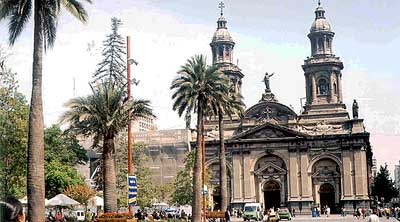
Think of Chile. What immediately comes to mind? The 1973 Pinochet coup. That’s one loooooong skinny country. Nobel Prize-winning poet Pablo Neruda. The spectacular Andes. Large-scale industrial salmon farming. Some of those might ring a bell, anyway. They are (approximately) what popped into my head when I decided in early March 2004 to take advantage of some free time and residual funds from an excellent summer job and go visit a good friend on a fellowship in Chile.
It’s not unreasonable to suspect that on my recent trip to Chile I was continuously, pleasantly and not-so-pleasantly, surprised. And so I was.
One of the biggest shockers occurred right at the outset. When you arrive at the Santiago airport, a sign requests that Americans (and citizens of several other countries) present themselves at a little booth to pay a U.S. $100 reciprocity tax. At two o’clock in the morning and after a full day of traveling, that kind of surprise doesn’t sit well. You decide whether (and what type of) preparation would’ve lessened this blow.
The next surprise was the mountains. Even viewed initially upon nighttime arrival during a 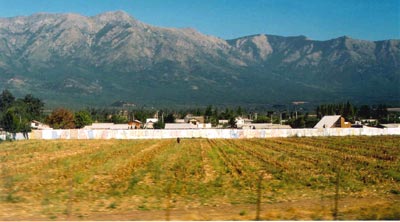 quick taxi ride through the city, the Cordillera de los Andes is an overwhelming feature of the Chilean landscape. I was awed by this presence, and I doubt that any forewarning could have made that sensation more (or less) powerful.
quick taxi ride through the city, the Cordillera de los Andes is an overwhelming feature of the Chilean landscape. I was awed by this presence, and I doubt that any forewarning could have made that sensation more (or less) powerful.
I struggled to understand the rapid, clipped Chilean Spanish, which presented an unexpected communication barrier. And as for making myself understood, well, after years of Spanish classes, even giving myself the benefit of the doubt I sounded like a big, inarticulate baby. ¡Qué frustración!
An interesting surprise, given the caution one has to exercise in Ecuador, where I had been briefly prior to this whirlwind Chile adventure: you can drink the tap water in Chile.
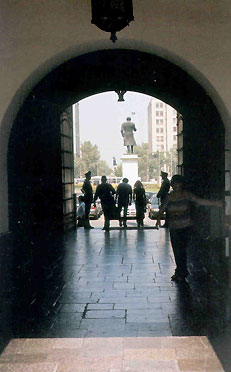 My friend told me before I arrived that the seats on the semi-cama bus recline 70%, putting you (to sleep) in the lap of luxury. It was lovely to realize that this mode of travel is indeed luxurious, especially on a gorgeous late summer day when the sun is shining brightly and the windows are cracked open and a beautiful-eyed, curly-pigtailed, mischievous young girl is trying her best to keep you awake but is not entirely successful because the allure of “the land of nod” is just… too… strong.
My friend told me before I arrived that the seats on the semi-cama bus recline 70%, putting you (to sleep) in the lap of luxury. It was lovely to realize that this mode of travel is indeed luxurious, especially on a gorgeous late summer day when the sun is shining brightly and the windows are cracked open and a beautiful-eyed, curly-pigtailed, mischievous young girl is trying her best to keep you awake but is not entirely successful because the allure of “the land of nod” is just… too… strong.
Seeing agribusiness campuses prominently arrayed along the highway between Santiago and Temuco was staggering. You wouldn’t imagine that that stretch of road in Chile could somehow feel like industrial New Jersey, but (surprise!) it sort of does.
One of the most surprising of surprises, and ultimately one of the best of stories from this trip involves gypsies. Gypsies? Yes, gypsies.
When a friend of mine studied abroad in Chile for one year during college, the most popular telenovela in the country was called “Gypsy.” I think he saw it as rather absurd – or at least pleasantly ironic – that he was given numerous warnings about scams frequently pulled by gypsies, given the group’s timely (omni)presence in pop culture. This season, one of the most hyped telenovelas is called “Hippie.” To the best of my knowledge, there are no hippie scams, but folks’ attention seems to have shifted. So maybe it makes sense that no one warned me about the gypsies who – despite the change in television programming – haven’t stopped obtaining money from unsuspecting tourists.
I, for one, didn’t suspect anything from the friendly flowing-skirt-clad woman who asked me for money “for milk for the baby.” I gave her a completely insignificant 300 pesos, after which she offered to read my palm. While having my palm read, we were joined by a less friendly-looking gypsy comrade. My heart sank as I discovered that the rest of the money in my coin purse had suddenly disappeared. Go figure.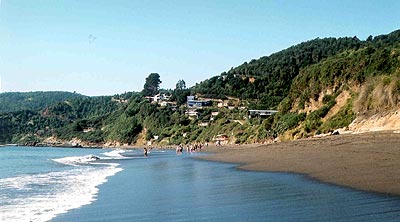
Adequate preparation for travel experiences is impossible, and that’s… wonderful. (Think about it for a moment, and I hope you’ll come to a similar conclusion.) Chile, like any destination, was full of unexpected events, sights, and people. Surely I could have been better prepared for my trip there, but it’s obvious – painfully so at times – that you can’t know or anticipate everything. And trips are just more exciting when you surrender to the unknown, when you take things as they come, rejecting preconceived notions of what your destination will be like and, more importantly, your notions of what it should be like. Whatever comes from the experience, let it be what it is. Your journey will surprise you. And that's a good thing.
